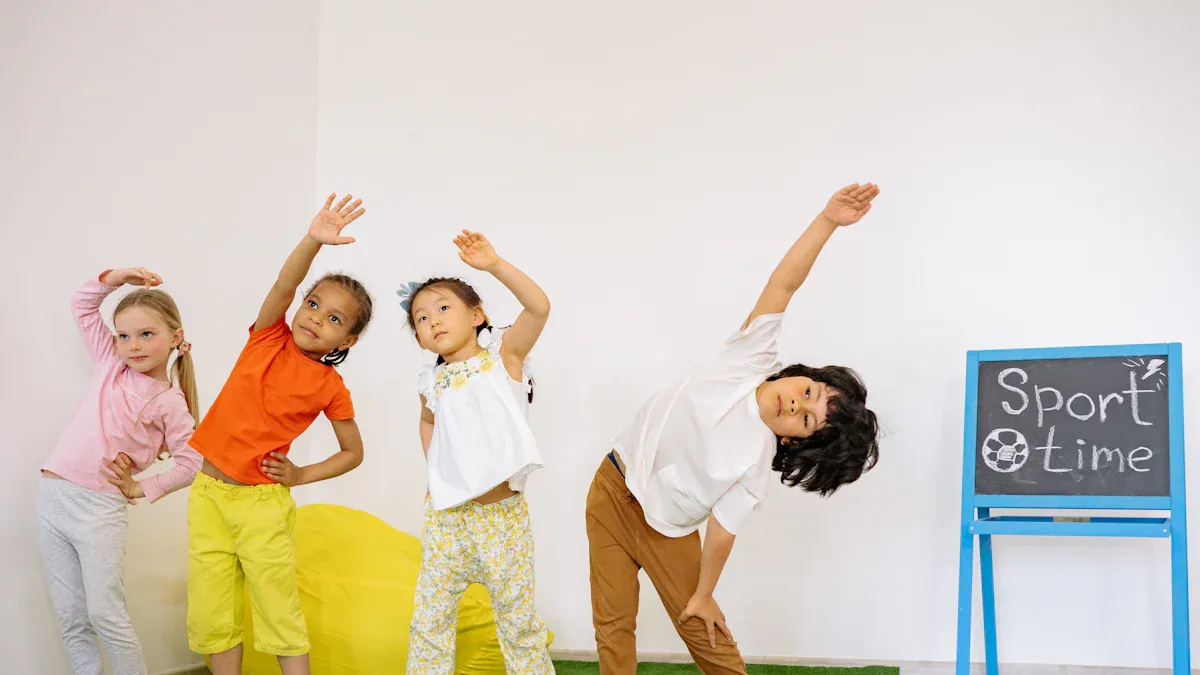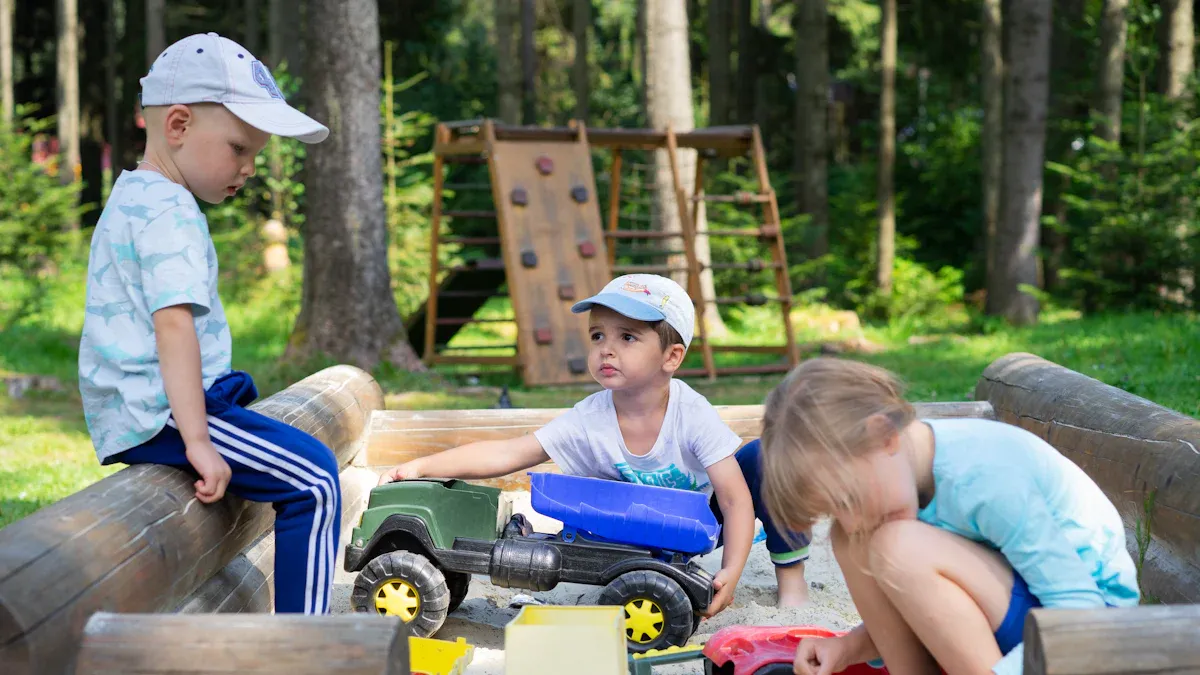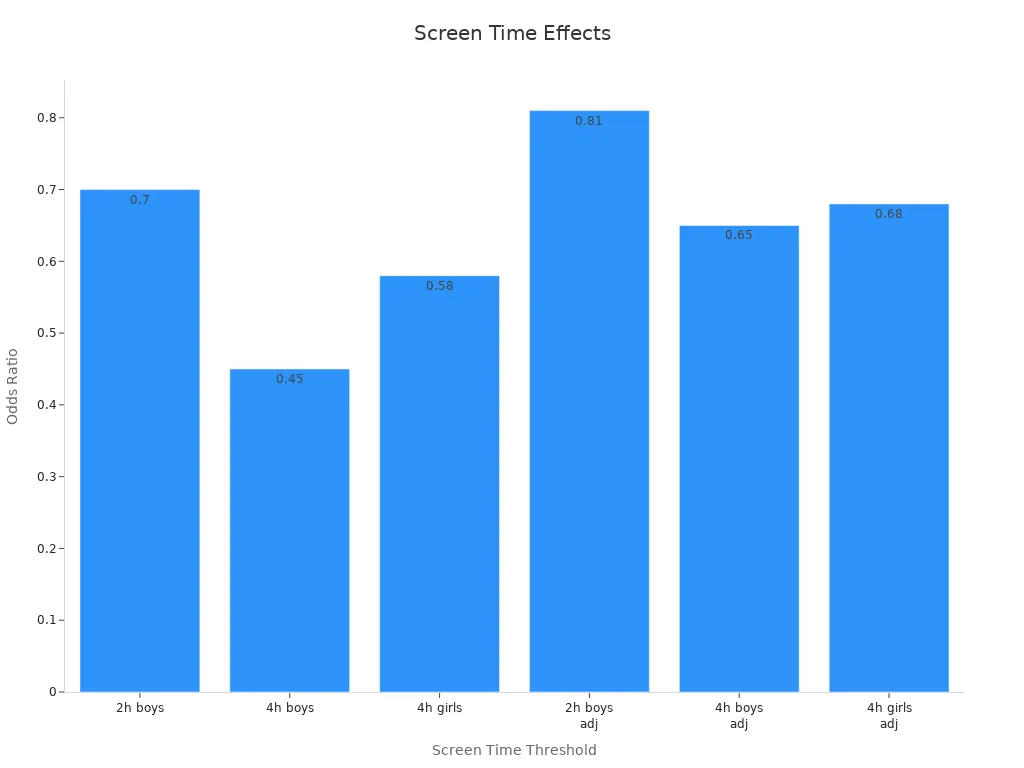
This morning, I watched my kids race outside, shoes untied and laughter echoing, while yesterday they spent hours glued to screens. I’ve learned that the importance of outdoor play goes far beyond just burning energy—it shapes their bodies and minds. When I look at studies with thousands of children, I see that more outdoor play links to better physical health, while too much screen time can hurt well-being. It’s crucial to balance screen time with outdoor activities to promote their overall health. Some days we nail the balance, some days we don’t.
“Small steps outside can make a big difference.”
Outdoor Play Benefits

Physical Health
I see my kids run and climb outside. Outdoor play helps their bodies grow strong. At the park, they walk on logs and hop on stones. This helps them balance better. Playing outside builds strength and endurance. It also improves motor skills. I read about a study with a 12-week play program. Kids in the program got stronger and had better balance. The American Academy of Pediatrics says outdoor play every day is important. It helps stop childhood obesity and supports healthy growth.
Here’s a quick look at how different outdoor play settings boost physical health:
Intervention Type | Health Outcomes Affected | Notes |
|---|---|---|
Opening schoolyards outside school hours | Increased physical activity | Positive effect in many studies |
Playground markings | Increased physical activity | Cost-effective and easy to scale |
Greening schoolyards | Physical, social, and mental health | Positive effects reported |
Large playscape construction | Increased physical activity | Works well in parks |
“Strong bodies grow from active play, not just from sitting still.”
Mental Well-Being
My kids seem happier after playing outside. Outdoor play helps them relax and feel less stressed. Nature can lower anxiety and help kids recover from hard days. When we spend time outside as a family, we feel closer and calmer. Activities like hiking or watching clouds help kids reset. These activities also help them become stronger inside.
Playing outside often makes nature’s good effects even stronger.
Nature and outdoor play help lower stress and boost mood.
Being with friends outdoors makes kids happier and less anxious.
“Fresh air, fresh mind.”
Social Skills
When my kids play outside with others, they learn teamwork. Outdoor play lets them practice sharing and solving problems. Games like tag or building forts teach them to work together. They also learn how to compromise. Outdoor learning helps kids care about others and be responsible. I have seen shy kids become more confident during group outdoor play.
Kids learn teamwork, talking, and how to solve problems.
Outdoor play helps kids feel more confident and care about others.
“Friendships grow where kids play together.”
Natural light and being in nature help kids sleep better. My kids fall asleep faster after playing outside. Outdoor play helps every part of their lives. It gives them strong bodies, happy hearts, and good friends.
Impact of Screen Time

Physical Effects
Last winter, I watched my kids curl up on the couch, eyes glued to their tablets. I noticed they moved less and snacked more. When screen time crept up, their energy dropped. I learned that the impact of screen time on physical health is real. Studies show that average daily screen time for children in Canada jumped from 2.6 hours to 5.9 hours during the pandemic. The number of kids spending more than 3 hours a day on screens doubled. This rise led to less movement and more sitting.
“Bodies need to move, not just sit.”
Odds Ratio (OR) for Poor Fitness | 95% Confidence Interval (CI) | Notes | |
|---|---|---|---|
>2 hours/day (boys) | 0.70 | 0.58 – 0.85 | Significant negative association with fitness |
>4 hours/day (boys) | 0.45 | 0.35 – 0.57 | Stronger negative association with fitness |
>4 hours/day (girls) | 0.58 | 0.43 – 0.78 | Negative association with fitness |

Mental and Emotional Effects
I’ve noticed that when my kids spend too much time on screens, their moods shift. They get cranky, sleep worse, and seem more anxious. Research backs this up. Too much screen time links to more stress, anxiety, and trouble sleeping. One study found that kids who used tablets in the evening had more bedtime struggles and shorter sleep. Poor sleep made their moods worse.
“Rested minds grow best.”
Social Concerns
Sometimes, after a long day of screens, my kids struggle to connect with others. They find it harder to share or talk about their feelings. Studies show that excessive screen time can slow social development. In one large study, kids with more screen time at age two had more trouble with speech and behavior by age three. Another study found links to learning delays and attention problems, especially in boys and preschoolers.
Aspect | Details |
|---|---|
Study Type | |
Sample Size | 2441 children aged 24, 36, and 60 months |
Key Findings | More screen time at 24 months predicted poorer development at 36 months (β = -0.06) |
Recommendation | Limit screen time and create family media plans |
“Screens can’t teach kindness—kids learn it from each other.”
Balance Screen Time for Children
Last week, I saw my daughter draw a rainbow outside. Her brother tried to balance on his scooter nearby. Later, they both watched funny animal videos on a tablet. Our days often switch between outdoor play and screen time. Finding the right mix is hard. But I notice it affects their bodies, minds, and moods.
Healthy Growth
When I balance screen time with outdoor play, my kids get stronger and healthier. Moving their bodies helps them stay at a healthy weight. It also builds strong muscles. I used to think kids would always run around enough. But research says most kids are not active unless parents help. I try to go outside with them, even for a short walk or a quick game.
Being active as a child helps you stay healthy for life.
Early habits last a long time, so what we do now matters.
Parents who play outside with kids help them move more.
National guidelines from the US, Canada, Australia, and the UK all say kids need daily active play and less screen time.
I put balls and chalk in our backyard. Sometimes, we walk to school instead of driving. These small changes help us stay active together.
“Healthy habits start with small steps—one walk, one game, one laugh at a time.”
Cognitive Development
My kids focus better after playing outside. They solve problems more easily too. When they build forts or make up games, I see their creativity grow. Studies show outdoor play helps kids solve problems, pay attention, and learn. Too much screen time can make it harder for kids to focus and learn new things.
Aspect | Drawbacks of Excessive Screen Time | |
|---|---|---|
Physical Health | Promotes physical activity, coordination, and motor skills | Sedentary lifestyle, poor posture, eye strain |
Emotional & Mental Well-being | Reduces stress, enhances emotional regulation, builds resilience | Increased anxiety, mood swings, disrupted sleep |
Social Development | Fosters social interaction, communication, empathy, creativity | Social isolation, negative impact on self-esteem |
Cognitive Development | Boosts problem-solving, improves focus and attention, supports learning abilities | Decreased attention span, reduced creativity, sleep disruption |
Educational Screen Time | Provides interactive learning tools and fosters creativity when balanced appropriately | Excessive use leads to cognitive and academic challenges |
A study followed kids from when they were toddlers. It found that more outdoor play at age two helped lower the bad effects of screen time on daily skills by almost 20%. Outdoor play also helped kids have better social skills, no matter how much screen time they had.
“Brains grow best with sunshine, fresh air, and a little dirt.”
Lifestyle Habits
Some days, I worry about how much time my kids spend on screens. Too much screen time can cause sleep problems and cranky moods. I read that teens who use screens for four or more hours a day feel more anxious or sad. Even younger kids can have trouble sleeping and focusing if they use screens too much. We keep our routines simple. We have meals without screens, set times for screens, and always make time for outdoor play.
High screen time links to more anxiety and sleep problems.
Kids with clear routines and outdoor play have better habits.
Experts say kids over six should have 1-2 hours of screen time, plus lots of active play and face-to-face time.
I look at the World Health Organization’s guidelines when I set limits. Here’s what they say for young children:
Age Group | Recommended Screen Time | Notes |
|---|---|---|
Infants (0-1 yr) | None | Focus on interactive floor-based play |
1 year | None | Encourage active play and movement |
2 years | Less than 1 hour per day | Less is better |
3-4 years | No more than 1 hour per day | Combine with at least 3 hours of active play |
5+ years | 1-2 hours per day (experts) | Prioritize quality content and outdoor activities |
Making outdoor play part of our daily routine helps us. We turn off screens during meals and before bed. I encourage drawing, reading, or helping in the garden. Some days we do well, some days we don’t. I remind myself that every small step matters.
“Balance isn’t perfect—it’s a practice, not a finish line.”
Tips to Balance Screen Time
Set Limits
Last night, I caught myself scrolling on my phone while my son asked me to play. That moment reminded me how easy it is to lose track of time on screens. I’ve learned that setting clear limits helps everyone in our home. I talk with my kids about why we need boundaries and involve them in making our family rules. We agree on tech-free zones, like the dinner table and bedrooms, and set a “no screens before bed” rule.
Parental involvement and early limit-setting help kids develop better sleep habits and social skills.
Children who watch more than an hour of TV daily are more likely to become overweight.
Creating a family media plan protects our time together and keeps routines predictable.
I also try to model healthy habits by putting my phone away during family time. When I join my kids in choosing what to watch or play, we talk about what we see and learn together.
“Boundaries aren’t just rules—they’re acts of love.”
Encourage Outdoor Play
Some afternoons, I watch my kids invent wild games in the backyard. I see their faces light up as they run, climb, and explore. Outdoor play gives them a chance to move, create, and solve problems. Research shows that time outside boosts happiness, lowers stress, and helps kids focus better.
Outdoor play improves strength and keeps bodies healthy.
Nature helps children manage stress and feel happier.
Unstructured outdoor activities build creativity and teamwork.
We keep a basket of balls and chalk by the door. Sometimes, we plan family outings to parks or nature trails. Even a short walk after dinner can turn into an adventure.
“Fresh air is the best reset button.”
Family Involvement
I notice that when we do things together, my kids choose outdoor activities over screens. Family outings, like picnics or bike rides, make memories and help us all unplug. Studies show that when families join in, children prefer outdoor play and spend less time on devices.
I try to join my kids outside, even if it’s just for a quick game of tag. We talk, laugh, and share stories. These moments build trust and make it easier to balance screen time. When I set limits and join in, my kids follow my lead.
“Together is our favorite place to be.”
Some days, we get it right. Other days, screens sneak in. I remind myself that every small step counts. Our goal is progress, not perfection.
Last night, I found a muddy shoe by the door and a crayon drawing taped to the fridge. These small signs remind me why I try to balance screens and outdoor play. I’ve noticed my kids feel happier, sleep better, and connect more when we spend time outside. What’s helped in our home is starting with one small change—like a walk after dinner or a tech-free breakfast.
“Little choices today build healthy habits for tomorrow.”
Let’s take it one step at a time—progress, not perfection.


